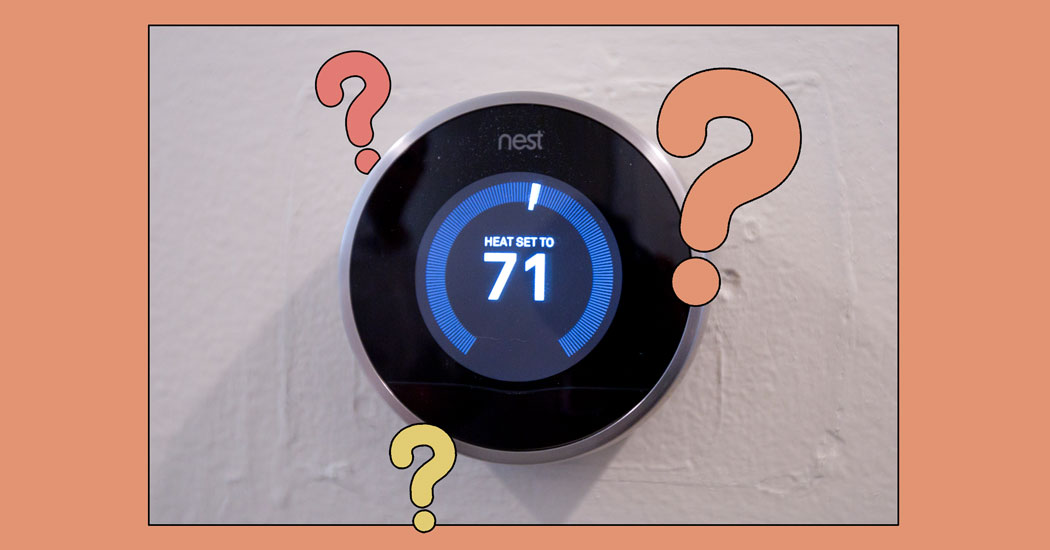Smart thermostats first hit the market in the early 2010s as a way to strategically cut your electricity bill while still keeping your home nice and cozy.
Brands claim up to 26 percent savings on heating and cooling bills. But some experts say that’s an overstatement. The Environmental Protection Agency, for instance, estimates approved smart thermostats can save households about 8 percent on bills, or about $50 a year. A few independent studies say the savings are probably even lower.
So, how much money and energy do smart thermostats really save? And what are the environmental benefits?
How they work
Smart thermostats like Google Nest, Ecobee and Honeywell tweak your house’s heating and cooling based on your everyday habits. They use motion sensors and your Wi-Fi to know whether you’re home, and switch the heat and air-conditioning to energy-saving mode when you’re out. And, you can connect them to your smartphone so you can make adjustments. (Which is not always good. More on that later.)
Turning the heating or cooling back by seven to 10 degrees Fahrenheit during the eight hours you’re out for work or school can slash up to 10 percent from your utility bill, according to the U.S. Department of Energy.
“I’m a big fan. I think I own six of them,” said Christopher Roland Knittel, associate dean for climate and sustainability at the MIT Sloan School of Management. “The biggest benefit is when you land at the airport from a long trip and you’re able to turn the thermostat on before getting home.”
The exact size of the savings depends on several factors. The overall efficiency of a house and the local climate matter, a lot.
And, not all heating and cooling systems work well with smart thermostats. Traditional furnaces and systems that pump hot or cold air into the house are easier to tweak than radiant systems that warm up floors or walls.
Basically, smart thermostats “are less effective with systems that take a long time to heat up,” said Hunter Mack, a professor of energy engineering at the University of Massachusetts Lowell.
Smart thermostats, silly humans
Another problem seems to be human error.
A study published in 2022 compared data from 1,385 households, half of them with smart thermostats, and found no statistically or practically significant differences between the two categories.
“We were really surprised,” said Christopher Clapp, a professor of applied microeconomics at the University of Chicago who was one of the authors.
His take is that thermostat manufacturers do not factor in the way people use the devices in the real world. Having easy control might incentivize homeowners to meddle with the temperature more.
The data collected by Dr. Clapp and his colleagues bore that out: It showed people would often override the thermostats with choices that used more energy. “These things will work, but only if you use them exactly as intended. You have to be committed to using it correctly,” Dr. Clapp said.
But other research indicates that most people are using them correctly. One study, involving data from 20,000 devices, found that only 12 percent of thermostats were consistently overridden, and fewer than 5 percent of them were overridden in ways that consumed 2 to 4 percent more energy.
Plus, Dr. Clapp’s team tested thermostats from 2012, and more modern smart thermostats have more advanced features.
The greater good
One of those advanced features is the ability of thermostats to redistribute energy loads throughout the day so that you’re consuming more at times when energy is widely available and less at times when energy is in higher demand and more expensive. This might include cooling a house before the price of electricity goes up, for example.
According to a Canadian study published this month, this feature can save the equivalent of about $3.50 on a utility bill in a typical month.
“From the consumer’s perspective, it might not be super valuable,” said Casey Wichman, an environmental microeconomist at the Georgia Institute of Technology and one of the authors of the study.
So, are smart thermostats worth the money?
The devices can cost from $50 to $800, depending on the make and model. Installation costs run from $200 to around $500, according to HomeAdvisor, a service that connects homeowners and contractors. That means, based on the E.P.A. estimate of $50 savings per year on average, your smart system could take anywhere from five to 26 years to pay itself off.
But, the environmental benefits could be significant: When combined, small energy savings in a lot of households at the right time can make a big difference for the grid. That’s because all those small savings during peak times can help energy suppliers avoid firing up additional generators, said Karen Palmer, an economist at who was also an author on the Canadian study.
Because generators used during these high-demand periods usually run on natural gas or coal, both potent sources of planet-warming emissions, that can help make a dent in climate change.
“It will make a difference,” Dr. Palmer said.


